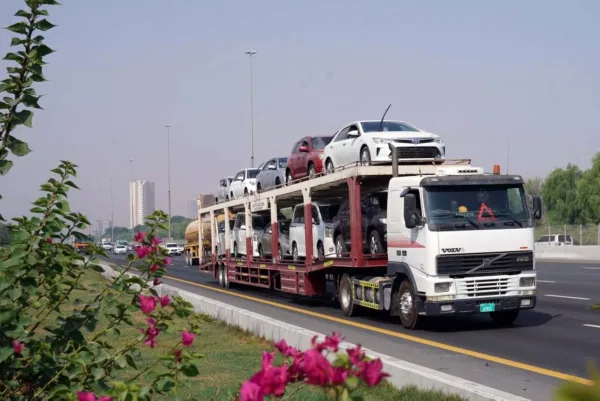Sharjah, one of the busiest emirates in the UAE, has implemented strict road regulations to manage traffic congestion and enhance road safety. Among these regulations, the heavy vehicle road timing restrictions play a crucial role in maintaining smooth traffic flow, ensuring safety, and reducing accidents caused by large trucks and commercial transport vehicles. The government has enforced specific time slots during which heavy vehicles are prohibited from using certain roads to minimize disruptions during peak hours.
Regulations on Heavy Vehicle Movement
Sharjah’s traffic authorities, in coordination with the Sharjah Police and Roads and Transport Authority (RTA), have enforced strict regulations to control heavy vehicle movement. These rules primarily apply to trucks, trailers, and large commercial transport vehicles that exceed specific weight and size limits. The restrictions aim to ease congestion, especially during rush hours, while also improving road safety.
The following are the key regulations governing heavy vehicle movement in Sharjah:

- Restricted Timings: Heavy vehicles are prohibited from operating on major roads during peak hours.
- Designated Routes: Specific roads are assigned for heavy vehicle movement to reduce congestion in residential and commercial areas.
- No-Entry Zones: Certain roads and highways have permanent restrictions on heavy vehicle entry.
- Special Permits: Some transport companies can apply for special permits to operate beyond restricted hours in urgent situations.
- Strict Monitoring & Fines: Surveillance cameras and traffic patrols monitor heavy vehicles to ensure compliance with restrictions.

Restricted Timings for Heavy Vehicles
The following are the standard restricted timings for heavy vehicles on key Sharjah roads:
- Morning Peak Hours: 6:30 AM – 9:00 AM
- Afternoon Peak Hours: 1:00 PM – 3:00 PM
- Evening Peak Hours: 5:30 PM – 9:30 PM
During these hours, heavy vehicles are prohibited from using most major roads, highways, and intersections in Sharjah. However, trucks carrying essential supplies, perishable goods, or emergency services may be exempt from these restrictions under special circumstances.

Key Roads with Heavy Vehicle Restrictions
Sharjah has identified several roads where heavy vehicle movement is restricted during peak hours. These include:
- Al Wahda Street – A major artery connecting Sharjah and Dubai, prone to heavy congestion.
- King Faisal Street – One of Sharjah’s busiest commercial streets.
- Sheikh Mohammed Bin Zayed Road (E311) – A vital highway connecting the UAE’s northern and southern regions.
- Emirates Road (E611) – Another key highway where truck movements are regulated.
- Industrial Areas – Some roads in industrial areas have designated truck-only routes to prevent congestion near residential neighborhoods.
- Al Dhaid Road – A major connecting route to the central and eastern regions of Sharjah.
These restrictions are strictly enforced through road surveillance, police patrols, and automated monitoring systems.
Impact on Traffic and Road Safety
The heavy vehicle road timing restrictions have significantly impacted traffic flow and road safety in Sharjah. Some of the key benefits include:
- Reduced Traffic Congestion – Limiting truck movement during peak hours has eased congestion, especially on main roads leading to Dubai and Ajman.
- Enhanced Road Safety – Heavy vehicles are a common cause of accidents, and restricting their movement has led to fewer collisions.
- Better Commuter Experience – With smoother traffic flow, daily commuters and public transport users experience reduced travel time.
- Environmental Benefits – Less congestion means lower fuel consumption and reduced carbon emissions, contributing to a greener environment.
However, some challenges persist, such as the need for improved infrastructure to accommodate designated truck lanes and better coordination between authorities and transport companies.
Penalties for Violating Heavy Vehicle Restrictions
To ensure compliance, the Sharjah Police and Traffic Department impose heavy fines and penalties for violations. The penalties include:
- AED 1,000 fine for violating peak-hour restrictions.
- Black points on driver’s license for repeated offenses.
- Vehicle impoundment for serious violations or operating without a permit.
- Company fines and license suspension for transport firms that fail to comply with regulations.
Strict enforcement through surveillance cameras and police patrols ensures that heavy vehicle operators adhere to these rules.
Exemptions and Special Permits
While heavy vehicle restrictions are strictly enforced, some vehicles are exempt under specific conditions. These include:
- Emergency and Medical Supply Trucks – Vehicles transporting medical supplies, oxygen, and emergency equipment.
- Food and Perishable Goods Transport – Trucks carrying essential food supplies that require immediate delivery.
- Construction Vehicles – Only under specific government approvals for urgent infrastructure projects.
- Public Service Vehicles – Municipal services such as waste management and water tankers.
Businesses that require heavy vehicle movement outside the allowed hours can apply for a special permit through the Sharjah Municipality or RTA.
Future Developments and Improvements
Sharjah authorities continue to evaluate the effectiveness of heavy vehicle restrictions and introduce improvements to optimize traffic management. Some proposed future developments include:
- Dedicated Truck Lanes – Plans to create exclusive truck lanes on major highways to facilitate smooth movement without affecting commuter traffic.
- Smart Traffic Management – Use of AI-based traffic systems to adjust restrictions dynamically based on real-time congestion levels.
- Expansion of Industrial Routes – Developing alternative roads to ease truck congestion in Sharjah’s industrial zones.
- Stricter Regulation on Heavy Vehicle Licensing – Introducing more rigorous screening for truck drivers and transport firms to enhance safety standards.
Conclusion
Sharjah’s heavy vehicle road timing regulations have played a critical role in improving traffic efficiency, road safety, and environmental sustainability. By enforcing peak-hour restrictions, designating specific truck routes, and implementing strict penalties, authorities have successfully reduced congestion and accidents caused by heavy vehicles.
However, as urban expansion and commercial transport demands grow, continuous improvements in infrastructure, enforcement, and smart traffic solutions will be essential. Moving forward, a balance between economic growth, transport efficiency, and commuter safety will remain the key focus of Sharjah’s traffic management policies.
Do follow Uae stories for more Updates
JW Marriott Muscat Leads Oman with First Fully Automated Water Bottling Plant












